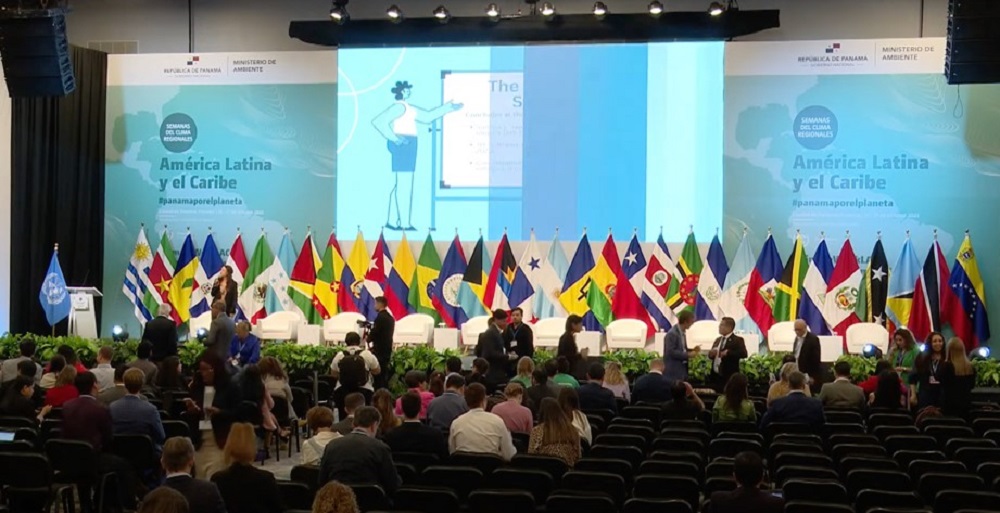More than 100 governments affirm broad support to better protect people displaced across borders by disasters and the effects of climate change

Geneva, Switzerland 14 October 2015 – The Swiss/Norwegian Nansen Initiative completed yesterday its two-day Global Consultation in Geneva, Switzerland, which brought together more than 350 delegates, including government ministers and officials from over 100 countries who endorsed the conclusions and recommendations of the “Agenda for the Protection of Cross-Border Displaced Persons in the Context of Disasters and Climate Change.” Delegates also included representatives from international and non-governmental organizations as well as academic institutions and civil society.
“Disaster displacement represents one of the biggest humanitarian challenges of the 21st century. Yesterday’s overwhelming endorsement of the Protection Agenda shows that States are ready to work together to tackle current and future displacement challenges. The Agenda provides States and other stakeholders with an innovative and forward-looking framework for action,” said Prof. Walter Kaelin, Envoy of the Chairmanship of the Nansen Initiative.
Floods, earthquakes, tropical storms and volcanic eruptions forced 184 million people to leave their homes between 2008 and 2014, an average of 26 million per year and the equivalent of one person per second. With climate change, these numbers are expected to increase and lead to more displacement. Some projections suggest that a one meter rise in sea level could mean that 150 million people will have to flee unless the construction of dams, sea-walls and similar measures are undertaken to protect vulnerable areas.
“Large numbers of people move out quietly to avoid stress. My region is not the only one. In many parts of Bangladesh, climate change ground zero is real,” said Bangladesh Foreign Minister Abul Hassan Mahmood Ali in his remarks. While the overall number of cross-border disaster-displaced persons is unknown, the Protection Agenda found that at least 53 countries – one in four States on Earth – have already received or refrained from returning children, women and men affected by disasters. “After the 2010 earthquake in Haiti, Brazil created a legal channel that allowed Haitians to access Brazilian territory without the use of illegal routes or falling prey to smugglers, with more than 26,000 visas granted to Haitians,” said Minister Counsellor Pedro Dalcero, delegate from Brazil.
“In a world where an international convention is not feasible – and maybe even not adequate due to big regional differences of dynamics and responses, the Nansen Initiative provides a toolbox that can be adapted to each region’s distinct challenges and needs. There are many, many tools,” insisted Prof. Kaelin. “Experiences and practices already exist. Let’s work together to harmonize and replicate them wherever it is needed.”
The Protection Agenda also highlights the importance of avoiding displacement in the first place by building community resilience to disasters, facilitating voluntary migration, conducting planned relocation out of unsafe areas, and responding to the needs of internally displaced persons in disaster situations. “We cannot ignore the issues of migration and need to bring them out from the shadows of the climate change and disaster risk reduction debate. Failing to do so would be like burying our heads in the sand during the high tides,” pressed Cook Islands Prime Minister Henry Puna. Less than two months before the Paris Climate Change Conference, the latest version of the draft climate agreement still does not include any references to climate-related human mobility.
“Let’s not leave books on bookshelves. It is time to act and turn theory into action to address cross-border disaster-displacement. We have a historic opportunity to use the endorsed Protection Agenda as a guide and ensure that the issue is included in the Paris agreement. We cannot miss it,” concluded the Envoy of the Nansen Initiative. The nexus between climate change and displacement, and the need to act now to mitigate the effects of climate change were also echoed by the majority of the delegations.
———- Launched in October 2012 by the Governments of Norway and Switzerland, the Nansen Initiative is a state-led, bottom-up consultative process intended to build consensus on the development of an Agenda for the Protection of Cross-Border Displaced Persons in the Context of Disasters and Climate Change. Over three years, the Nansen Initiative held regional consultations with governments as well as the civil society from the Pacific, Central America, South America, the Horn of Africa, Southern Africa, Southeast Asia and South Asia to build a thorough knowledge base on disaster displacement.
Useful Links
Nansen Initiative Global Consultation
Download the Global Consultation Report
 Loading...
Loading...
Download the Protection Agenda
